Liberation and Life in the Spirit

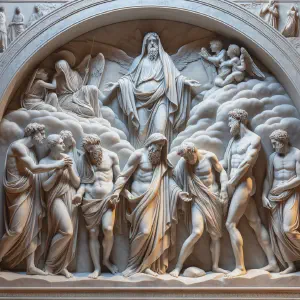
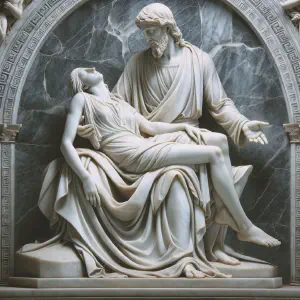
In this transformative era, Jesus, teaching in a synagogue on the sabbath, encountered a woman crippled by a spirit for eighteen long years. Bound by her affliction, she was a living testimony to the weight of earthly sufferings. Jesus, moved by compassion, declared her free from her infirmity. As he laid his hands on her, she straightened up, her physical transformation mirroring the spiritual liberation offered to all. She glorified God, her healer and liberator. However, not all hearts were receptive. The synagogue leader, rigid in his understanding of the sabbath, rebuked the act of healing. Jesus responded, highlighting the hypocrisy in their beliefs. He drew parallels to their sabbath practices, questioning why a daughter of Abraham should not be freed from Satan’s bondage on this holy day. His words, sharp yet true, humiliated the adversaries but uplifted the crowd, who rejoiced in the splendid deeds of Jesus. This era, marked by the Spirit’s leading, was a testament to the transformative power of divine love and truth. It was a time when the children of God, liberated from their infirmities and fears, walked in the light of salvation, bearing witness to the God of their salvation.
Five Questions
What is the significance of being “led by the Spirit of God” as mentioned in Romans 8:12-17?
Being led by the Spirit of God signifies a transformative journey from living according to the flesh to embracing a spiritual existence. It means acknowledging our identity as God’s children, and understanding that our actions, choices, and life path should reflect the guidance and influence of the Holy Spirit. This spiritual leadership brings about a profound change in how we view ourselves and our relationship with God, moving from fear and bondage to freedom and inheritance as co-heirs with Christ.
How does the Psalm 68 contribute to the theme of God as a protector and provider?
Psalm 68 reinforces the idea of God as a defender and nurturer, especially for the most vulnerable in society, like orphans and widows. It portrays God as a being who provides a home for the forsaken and prosperity for those imprisoned by various circumstances. This Psalm underlines God’s role not just as a spiritual entity, but as an active presence in the lives of those who are in dire need, offering physical, emotional, and spiritual support.
In the context of John 17:17b, 17a, what does Jesus mean by “Your word is truth”?
In this context, “Your word is truth” reflects Jesus’ emphasis on the importance and sanctity of God’s teachings. It implies that God’s word, as revealed in the scriptures and through Jesus’ teachings, is the ultimate truth that should guide our lives. This truth is not just a collection of facts, but a transformative power that consecrates and sanctifies those who embrace it, aligning them with God’s will and purpose.
What does the healing of the crippled woman on the sabbath in Luke 13:10-17 teach us about Jesus’ interpretation of the law?
The healing of the crippled woman on the sabbath highlights Jesus’ interpretation of the law as being founded on compassion and mercy rather than rigid adherence to rules. Jesus challenges the legalistic approach of the synagogue leader, illustrating that the purpose of the sabbath is not to restrict acts of goodness but to promote wellbeing and deliverance. He shows that the law’s spirit is more important than its letter, emphasizing that doing good and freeing those in bondage, physically or spiritually, aligns with God’s intent for the sabbath.
What overarching message do these scriptures collectively convey to the faithful?
Collectively, these scriptures convey a message of spiritual transformation, liberation, and divine providence. They encourage believers to live a life guided by the Spirit, emphasizing our identity as God’s children and heirs. They remind us of God’s role as a protector and provider for the vulnerable, and they teach us about the importance of compassion and mercy in interpreting God’s law. Overall, they invite us to a deeper understanding and experience of God’s love, truth, and salvation.
Bible Study
Romans 8:12-17
Brothers and sisters,
we are not debtors to the flesh,
to live according to the flesh.
For if you live according to the flesh, you will die,
but if by the spirit you put to death the deeds of the body,
you will live.For those who are led by the Spirit of God are sons of God.
For you did not receive a spirit of slavery to fall back into fear,
but you received a spirit of adoption,
through which we cry, “Abba, Father!”
The Spirit himself bears witness with our spirit
that we are children of God,
and if children, then heirs,
heirs of God and joint heirs with Christ,
if only we suffer with him
so that we may also be glorified with him.
Paul the Apostle, author of Romans, emphasizes the Christian transition from living according to the flesh to living by the Spirit. This passage aligns with Catholic teachings on the nature of grace, the transformative power of the Holy Spirit, and our adoption as God’s children. It reflects the concept of dying to sin and being reborn in Christ, resonating with the sacrament of Baptism and the doctrine of justification by faith and grace.
Psalm 68:2 and 4, 6-7ab, 20-21
God arises; his enemies are scattered,
and those who hate him flee before him.
But the just rejoice and exult before God;
they are glad and rejoice.
The father of orphans and the defender of widows
is God in his holy dwelling.
God gives a home to the forsaken;
he leads forth prisoners to prosperity.
Blessed day by day be the Lord,
who bears our burdens; God, who is our salvation.
God is a saving God for us;
the LORD, my Lord, controls the passageways of death.
This psalm, attributed to King David, portrays God as a protector of the vulnerable and a provider for those in need. It echoes Catholic social teaching, particularly the preferential option for the poor and vulnerable. The psalm’s themes are consistent with the Catholic understanding of God’s providence and align with the Corporal Acts of Mercy, emphasizing God’s care and compassion for all, especially the marginalized.
John 17:17b, 17a
Your word, O Lord, is truth;
consecrate us in the truth.
Attributed to Jesus Christ in the Gospel of John, this passage underscores the sanctity and truth of God’s word. It reflects the Catholic emphasis on the importance of Scripture in the life of the faithful, aligning with the Church’s teachings on Divine Revelation and the sanctifying grace that comes from living in truth. This passage also supports the Catholic view of sanctification, emphasizing the transformative and consecrating power of God’s truth.
Luke 13:10-17
Jesus was teaching in a synagogue on the sabbath.
And a woman was there who for eighteen years
had been crippled by a spirit;
she was bent over, completely incapable of standing erect.
When Jesus saw her, he called to her and said,
“Woman, you are set free of your infirmity.”
He laid his hands on her,
and she at once stood up straight and glorified God.
But the leader of the synagogue,
indignant that Jesus had cured on the sabbath,
said to the crowd in reply,
“There are six days when work should be done.
Come on those days to be cured, not on the sabbath day.”
The Lord said to him in reply, “Hypocrites!
Does not each one of you on the sabbath
untie his ox or his ass from the manger
and lead it out for watering?
This daughter of Abraham,
whom Satan has bound for eighteen years now,
ought she not to have been set free on the sabbath day
from this bondage?”
When he said this, all his adversaries were humiliated;
and the whole crowd rejoiced at all the splendid deeds done by him.
In this Gospel passage, Jesus heals a woman on the Sabbath, challenging the prevailing interpretation of the law. It illustrates the Catholic principle of the primacy of compassion and mercy over legalistic interpretations of religious observance. This act of healing aligns with Jesus’ role as the ultimate high priest and healer, consistent with Catholic teachings on the Sabbath as a day of welfare and the Works of Mercy.
Lessons
These passages remind us of the profound truth that we are not bound by the limitations of the flesh, but are called to a life led by the Spirit of God. As children of God, we receive a spirit of adoption, not of fear, affirming our identity as heirs alongside Christ. The Psalm emphasizes God’s role as the protector of the vulnerable and the provider of refuge to the forsaken. In the Gospel, Jesus’ act of healing on the sabbath teaches us about the priority of compassion and mercy over rigid adherence to law. This collection of readings invites us to embrace our spiritual inheritance, rely on God’s saving grace, and live in the freedom and truth of His love.
Meditation Prayer
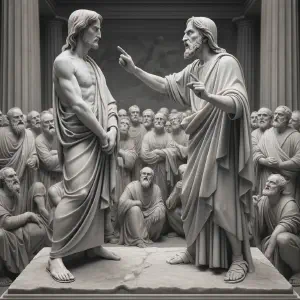
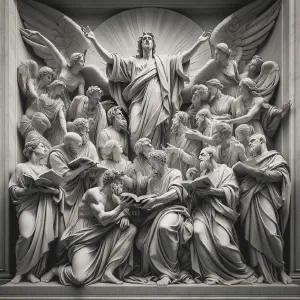
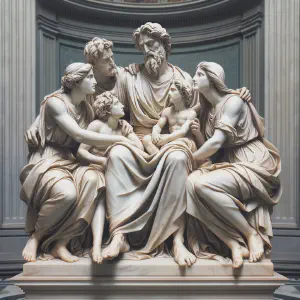
Through the Gospel of John, we are consecrated in Your truth. Let this sanctification permeate our minds and hearts, leading us to positive emotional and mental well-being. May Your truth liberate us from the shackles of fear and uncertainty, and instill in us a peace that surpasses all understanding. In the healing acts of Jesus in Luke, we witness the triumph of compassion over legalism. Empower us, O Divine Healer, to prioritize mercy in our daily lives. Teach us to recognize the Sabbath not merely as a day of rest but as an opportunity for acts of kindness and love. Therefore, Lord, we pray for the courage to live out these teachings. May our actions reflect the grace and mercy You have so generously bestowed upon us. Let us be vessels of Your love, bringing light to those in darkness, hope to those in despair, and comfort to those in distress. In Your holy name, we pray. Amen.